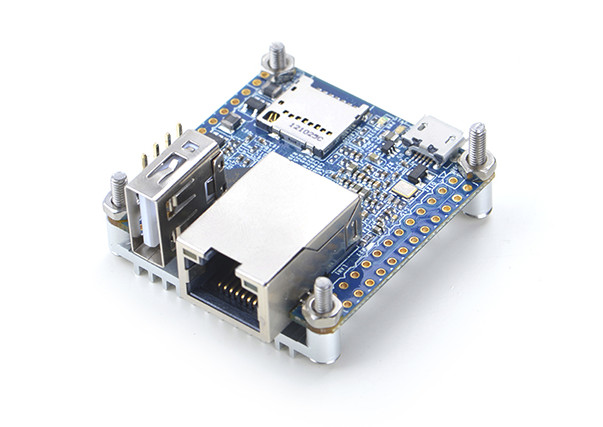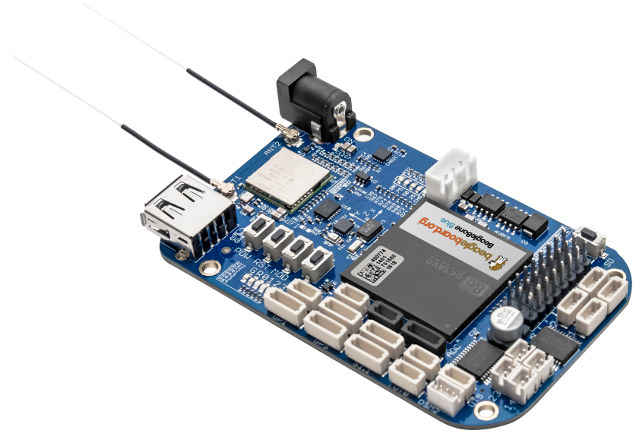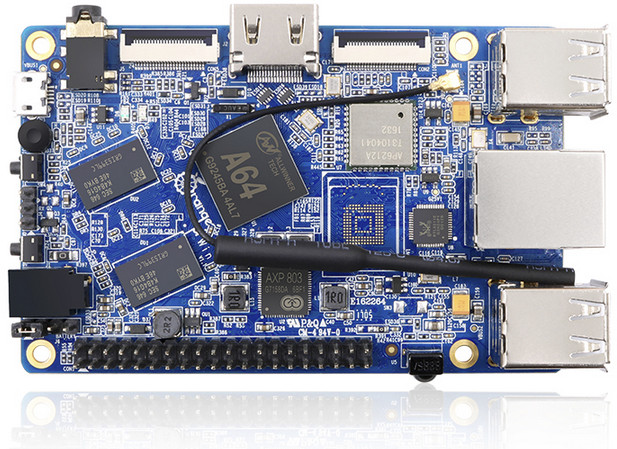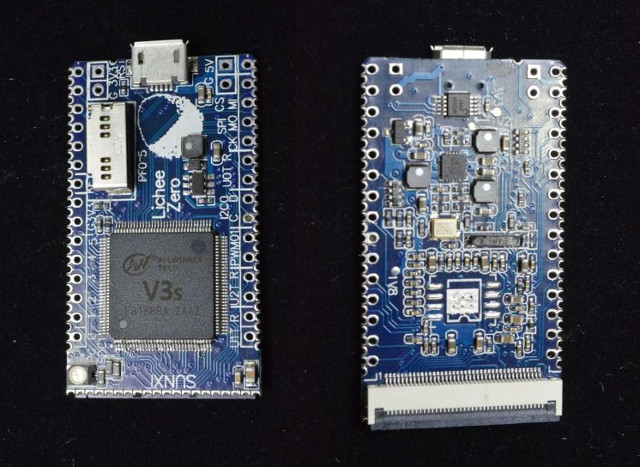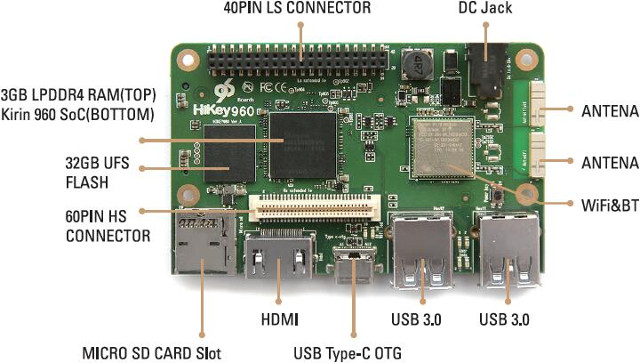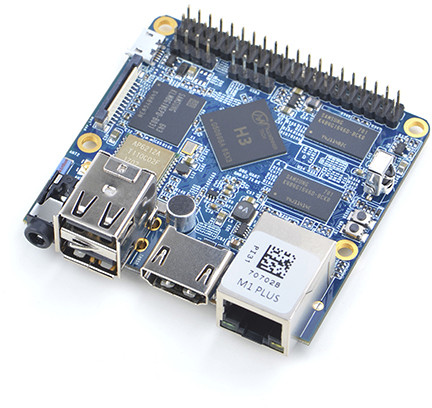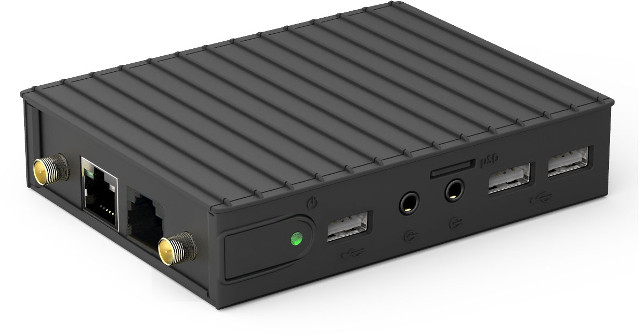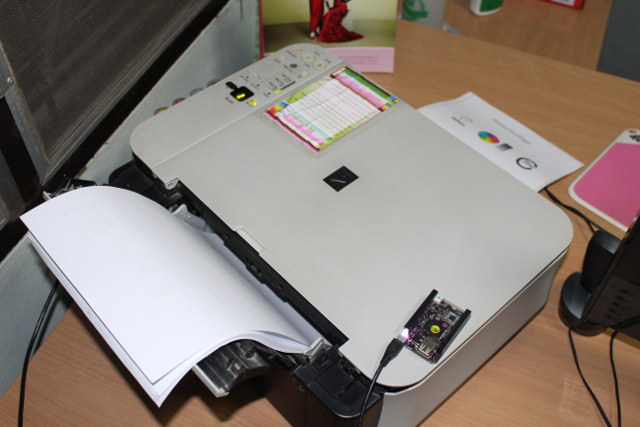NanoPi NEO is a cool little board, and I’ve been using it with Armbian as a 24/7 MQTT + Domoticz server for several weeks without any issues so far. FriendlyElec has now an update with NanoPi NEO2 featuring Allwinner H5 quad core Cortex A53 processor instead of Allwinner H3 Cortex A7 processor, a faster Gigabit Ethernet connection, and a new audio header. NanoPi NEO2 specifications: SoC – Allwinner H5 quad core Cortex A53 processor with an ARM Mali-450MP GPU System Memory – 512 MB DDR3 Storage – micro SD card slot Connectivity – Gigabit Ethernet (via RTL8211E-VB-CG chip) USB – 1x USB 2.0 host ports, 1x micro USB OTG port, 2x USB via headers Expansion headers 24-pin header with I2C, 2x UART, SPI, PWM, and power signals 12-pin header with 2x USB, IR pin, I2S 5-pin audio header with microphone and LINE out signals Debugging – 4-pin header for serial […]
$80 BeagleBone Blue Board Targets Robots & Drones, Robotics Education
Last year, we reported that BeagleBoard.org was working with the University of California San Diego on BeagleBone Blue board for robotics educational kits such as EduMiP self-balancing robot, and EduRover four wheel robot. The board has finally launched, so we know the full details, and it can be purchased for about $80 on Mouser, Element14 or Arrow websites. BeagleBone Blue specifications: SiP (System-in-Package) – Octavo Systems OSD3358 with TI Sitara AM3358 ARM Cortex-A8 processor @ up to 1 GHz, 2×32-bit 200-MHz programmable real-time units (PRUs), PowerVR SGX530 GPU, PMIC, and 512MB DDR3 Storage – 4GB eMMC flash, micro SD slot Connectivity – WiFi 802.11 b/g/n, Bluetooth 4.1 LE (TI Wilink 8) with two antennas USB – 1x USB 2.0 client and host port Sensors – 9 axis IMU, barometer Expansion Motor control – 8x 6V servo out, 4x DC motor out, 4x quadrature encoder in Other interfaces – GPIOs, 5x UARTs, 2x […]
$25 Orange Pi Win Development Board To Run Windows 10 IoT (and Linux, and Android)
Shenzhen Xunlong Software must already have over a dozen of Orange Pi boards, but this is not stopping them from launching more, and the company has just introduced Orange Pi Win, powered by Allwinner A64 processor, and beside supporting Linux and Android like other models, it’s rumored to run Windows 10 IoT too.Orange Pi Win specifications: SoC – Allwinner A64 quad core ARM Cortex A53 processor @ 1.2 GHz with Mali-400MP2 GPU System Memory – 1 GB DDR3 Storage – 2MB SPI flash, micro SD slot up to 64 GB, footprint for optional eMMC flash Video Output / Display interface – HDMI 1.4 up to 4K @ 30 Hz with CEC 3D and HDCP support,, MIPI LCD interface Audio – HDMI, 3.5 mm headphone jack, built-in microphone Connectivity – Gigabit Ethernet + 802.11 b/g/n WiFi & Bluetooth 4.2 (AP6212) USB – 4x USB 2.0 host ports, 1x micro USB OTG […]
$6 LicheePi Zero ARM Board Runs Linux 4.10, Supports Lots of Add-On Boards (Crowdfunding)
We’ve already covered LicheePi One board powered by Allwinner A13 processor, but it was not for sale out of China, and the developers are now back with LicheePi Zero board/module, slightly bigger than an SD card, featuring Allwinner V3s processor, and offered for as low as $6, or $8 with WiFi via an Indiegogo campaign. LicheePi Zero specifications: SoC – Allwinner V3s ARM Cortex A7 processor @ up to 1.2 GHz with an ARM Mali-400 GPU, 512Mbit (64MB) DDR2 on-chip Storage – micro SD card slot, SPI flash (not 100% clear if it will be populated when shipped to backers) Display – FPC40 RGB Connector with support for 800×480 RGB LCD Audio – Audio codec USB – micro USB OTG port Expansion 2x 15 headers with 2.54mm pitch, breadboard friendly with GPIOs, 2x UART, 1x SPI, 2x I2C,ADC, 1x PWM 2x 30 half-holes with 1.27mm pitch with OTG USB,MIPI CSI,EPHY,RGB […]
HiKey 960 Development Board Powered by Hisilicon Kirin 960 Cortex A73/A53 Processor To Sell for $239
LeMaker is about to launch a successor to Hikey board with a new 96Boards compliant development board with HiKey 960 featuring the powerful Hisilicon Kirin 960 processor found in Huawei Mate 9 smartphone, as well as 3GB LPDDR4 memory, 32GB UFS storage, HDMI, USB 3.0 ports and so on. Hikey 960 board specifications: SoC – Kirin 960 octa-core big.LITTLE processor with 4x ARM Cortex A73 cores @ up to 2.4 GHz, 4x Cortex A53 cores @ up to 1.8 GHz, and a Mali-G71 MP8 GPU System Memory – 3GB LPDDR4 SDRAM Storage – 32GB UFS flash storage + micro SD card slot Video Output / Display Interface – 1 x HDMI 1.4 up to 1080p, 1x 4-lane MIPI DSI connector Connectivity – Dual band 802.11 b/g/n/ac? WiFi and Bluetooth 4.1 with two antennas USB – 2 x USB 3.0 type A host ports, 1x USB 2.0 type C OTG port […]
FriendlyELEC NanoPi M1 Plus Allwinner H3 Board Adds Gigabit Ethernet, WiFi & Bluetooth, and an 8GB eMMC Flash
FriendlyELEC has introduced an update to NanoPi M1 board, aptly named NanoPi M1 Plus with a similar form factor and Allwinner H3 processor, but adding Gigabit Ethernet, 802.11 b/g/n WiFi & Bluetooth, and an 8GB eMMC flash, at the expense of one USB port that had to go to make place for the new features, and it got a little wider too.NanoPi M1 Plus board specifications: SoC – Allwinner H3 quad core Cortex A7 @ 1.2 GHz with an ARM Mali-400MP2 GPU up to 600 MHz System Memory – 1GB DDR3 Storage – 8GB eMMC flash + micro SD card slot Video & Audio Output – HDMI and 3.5mm jack for CVBS (composite + stereo audio) Connectivity – Gigabit Ethernet, 802.11 b/g/n WiFi and Bluetooth 4.0 dual mode (classic + low energy) with chip antenna and IPEX/u.FL connector USB – 2x USB 2.0 host ports, 1x 4-pin USB 2.0 […]
Compulab IOT-GATE-iMX7 is an NXP i.MX7 IoT Gateway for Industrial Applications
CompuLab has introduced IOT-GATE-iMX7 compact fanless IoT gateway and industrial controller built around the company’s CL-SOM-iMX7 system-on-module, and offering Ethernet, WiFi, Bluetooth, 3G and Zigbee connectivity.Compulab IOT-GATE-iMX7 gateway specifications: SoC – NXP i.MX 7 dual ARM Cortex-A7 processor @ up to 1GHz with ARM Cortex-M4 core @ 200Mhz, 2D graphics engine System Memory – Up to 2GB DDR3L-1066 Storage – Up to 32GB on-board eMMC + micro-SD socket Connectivity Dual Gigabit Ethernet Dual band WiFi 802.11 a/b/g/n Bluetooth 4.1 BLE Optional 3G cellular module via mini PCie socket Optional ZigBee NXP JN5168 module Display – DVI up to 1920×1080 using a HDMI connector Audio – 3.5mm jacks for stereo line out, stereo line in USB – 4x USB2.0 host ports, type-A connectors Serial – 1x RS485 / RS422 port, RJ11 connector; 1x RS232 port, ultra-mini serial connector; 1x serial console via UART-to-USB bridge, micro-USB connector Expansion mini-PCIe socket, full-size embedded […]
How to Use CHIP Board as a Linux Printer & Scanner Server
We have a Canon Pixma MP250 series multi-function USB printer connected to a Windows 10 laptop at home, and for several years, I had no problems printing from my Ubuntu computer to that printer. However, this setup recently stopped to work, and whatever I would do, printing would never start from my Ubuntu PC, even though the file was (allegedly) successfully transfered to the Windows 10 laptop connected to the printer. So I decided to setup my own printer server, as well as a scanner server since it’s a multi-function printer, using one of the boards from my collection. As I opened my cabinet, I wondered whether I would use an Orange Pi board, Raspberry Pi board, or Nano Pi board, but I needed WiFi since there’s no Ethernet in the office where the printer is located, and I found that Next Thing CHIP board was the ideal candidate as […]


